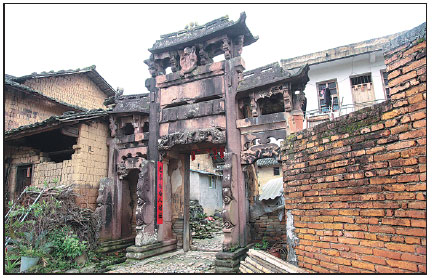County eyes prosperity through tourism
China Daily, June 17, 2016 Adjust font size:

A stone archway stands in Yangjiao Water Castle. Photos By Zhao Xiao / China Daily
One inscription reading bi li wan ren, or "precipice rising steeply like a tall wall", was engraved in the rock six meters off the ground - each character standing 2.3 meters high.
Junmenling is just one of the 19 towns in Huichang, which also boasts 319 rivers and waterways stretching across a panorama of valleys and hills, according to the county tourism bureau.
Each district of the county can lay claim to its own unique tourist draw, with some even related to modern Chinese history. Mao Zedong, the founder of the People's Republic, lived in Huichang for a little over a month, and in 1934 climbed Mount Huichang, writing a poem proclaiming that "the scenery here is uniquely good".
Another Chinese leader, Deng Xiaoping, served as a top official in Huichang for 10 months in the 1930s. Both Mao and Deng's former residences still stand for visitors to see today.
Other tourism draws relate to folk customs, with picturesque villages offering an experience of genuine Hakka culture - their worship of Laigong, the guardian of happiness and safety, and their bewildering array of cuisine and beverages.
Economically, Huichang's most important resources are its abundant reserves of tin, rock salt, rare earth metals and fluorite, which it hopes to exploit through the development of chemical and other industries to help lift the county's remaining poor out of the poverty.
"Huichang is the only place in the world that boasts both rock salt and fluorite, a blessing for the county to develop chemical industries," said Cai Xiaowei, a top official from Huichang, who added that "targeted measures" were being take to help poor families.
In the next issue, we will report on a local school's experimental approach that blends basic education with vocational skills.